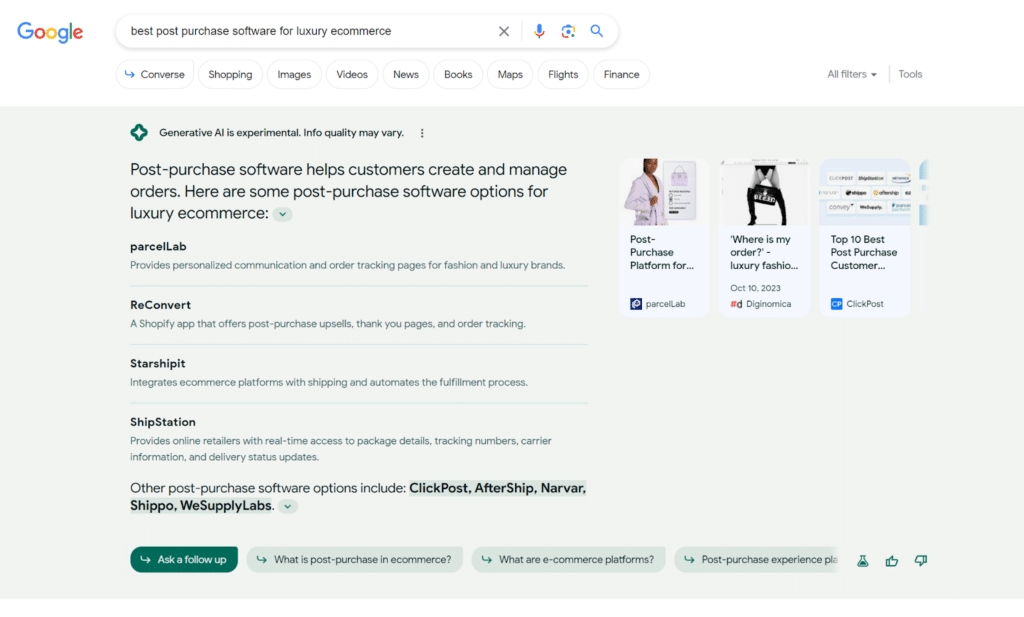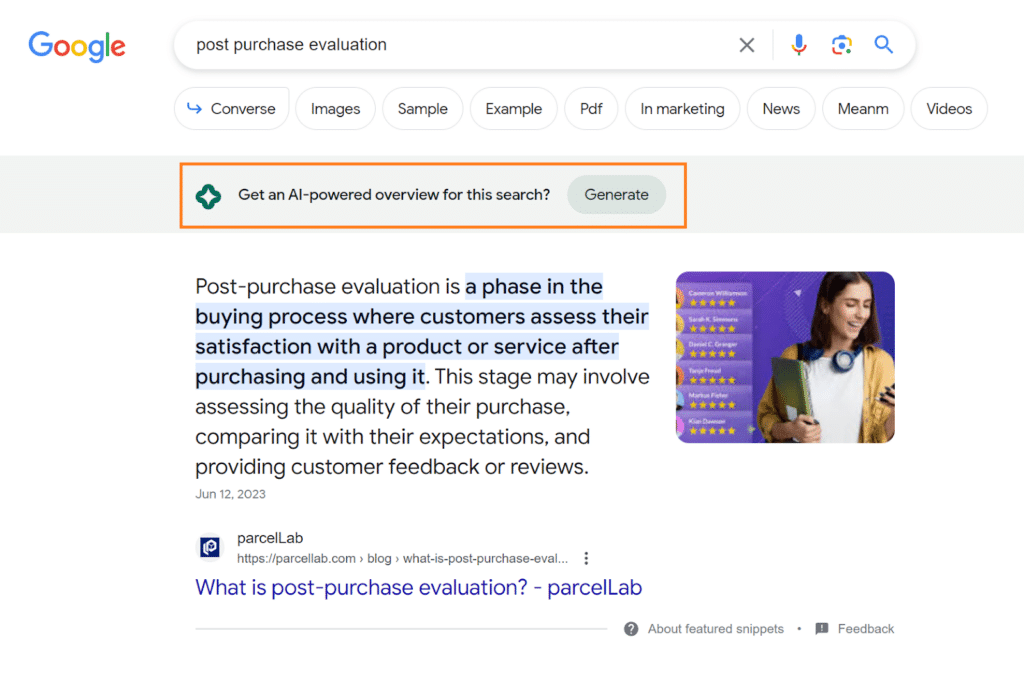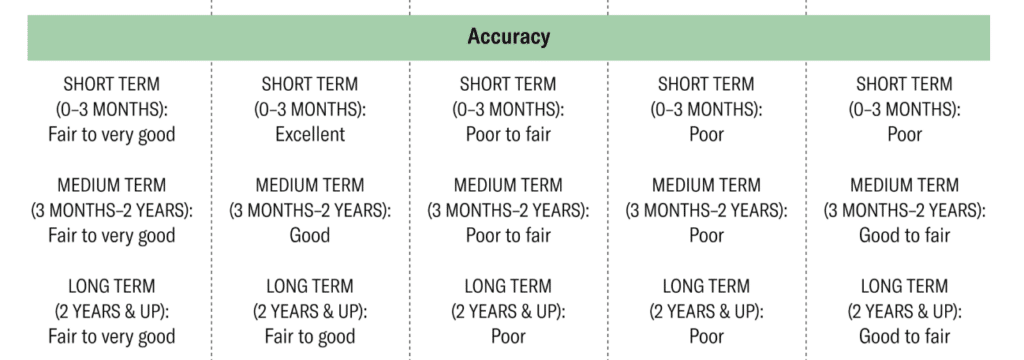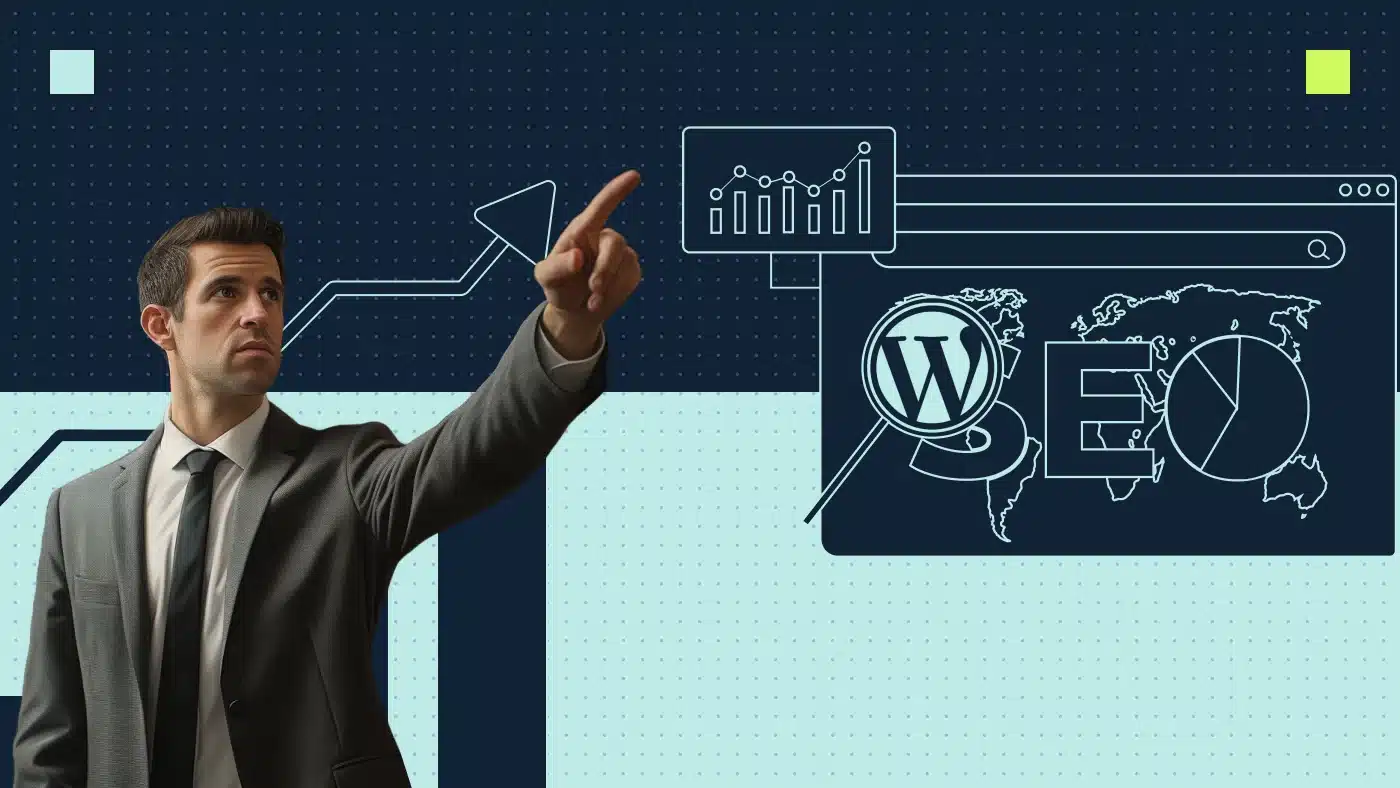For generations, we have been hearing of artificial intelligence and the impact it could have on society. And so Generative AI is not in the news for any small reason, it has completely changed the outlook of human production of the future. With DALL-E and Midjourney producing incredible imagery, and ChatGPT being able to pass the bar exams, MBAs and even be your Linux Admin, all executive managers need to assess how this AI will impact their daily workflows.
In this piece, however, we will be assessing how Google is “Supercharging Search with generative AI” and how can Marketing Executives and SEOs get ready for the impact this will have on their organic traffic steams. However, we will also touch on the weaknesses of AI, as you should know the limits of the technology.
What is generative AI?
“GenAI” refers to the outputs of Generative AI in tools such as ChatGPT, Google Bard, Midjourney, DALL-E and importantly: Google’s SGE (Search Generative Experience). Generative AI models acquire an understanding of the patterns and structure present in their training data, subsequently producing novel data that exhibits comparable attributes.
In this blog, we will look at the potential impact of GenAI on the marketing world, and how startups and other businesses relying on organic search to prepare themselves for a world where users increasingly make queries to demand summarized information versus reading long form content.
Understanding the value of SERPs
While it may seem obvious, majority of people who believe that SERPs may be dying soon are not aware of the depth of value provided by SERPs. Billions trust it everyday to navigate to important websites that deliver value.
While the co-pilot features of ChatGPT are obvious, people do not understand that it not a good tool to navigate into the depths of the web. It is a generator of information, but not a true broker between websites and the user. Even if I have been informed that the best electric car is “Car A” I still need to visit the vendor to customize and order it.
This is all to say that in the past years Google has invested deeply into making the SERPs valuable. And as we will learn soon, they are seeing GenAI as a tremendous opportunity to increase the value of SERPs.
Google has always been using machine intelligence:
Google’s quality and relevance algorithms have always been attempting to understand what content means and if it should be shown to users, and their language models have been tremendously competent at differentiating between valuable and invaluable language. But while selected and most relevant “featured snippets” highlight content from single websites, ChatGPT and GenAIs takes the radical step to generate content based on a variety of sources. This piece will also delve into how the 2 algorithms working together (SGE + 10 blue links) are a very powerful and complete search product.
Is a radical transformation of SERPs to be expected?
Before jumping into the details of how the SERP benefits not only users, we should look at how it benefits Google. More than 80% of Google’s revenue comes from Google Ads, and the majority of this is from the SERPs (Search Engine Results Page). It generated a total of $147 Billion in revenue from these streams in 2022.
This is all to say that radical transformation of SERPs should not be expected in the medium to long term, and that Google, as it always has, will make the decisions to improve the SERPs to provide users with high-quality results that answer their queries. Keep reading to understand how SERPs will evolve.
To consider: The pressure from TikTok
Something to understand for SEOs reading is that, a lot of changes on Google’s SERPs come not so much from the pressure from ChatGPT, but rather from TikTok. The trends of search engine usage by GenZ and Gen Aplha is pushing Google to update it’s SERPs, which may be part of an outdated form of searching. You can possible see changes having been made in the last 2 years, as the integration of videos from several social media platforms in SERPs.
In summary: Google will have to make changes based on new trends for search and that will have an impact on search methodologies.
The question: How will SGE fit in?
SGE: A world of more pronounced winners and losers
Considering what Google showed in their conference in May, and the open experiments running in Search Labs, they will be integrating SGE into SERPs soon to increase the value of generated results, and the data they have collected since over 2 decades. This means that featured snippets and the entire above the fold experience is getting a full upgrade, with highlighted summarizations more lengthy details curated together, as seen below:

As Google offers these results above the fold, all sites that are not part of SGE’s results, could get even less clicks than before. And while in Google conference in May, they showed blue links next to each line in SGE, it is presently not visible in Search Labs, possibly hinting that Google may think that somehow erodes the user’s experience.
However, as we tested below in Search Labs for parcelLab, in many cases Google is not confident in showing AI results automatically, and decides to give users the choice to generate results, which in many cases of clicking generates an error to be “Unable to generate AI results”. Hence this presents the case for 10 blue links remaining for long tail keywords for all queries for which Google has a lack of confidence.

N.B It is possible that users will be able to turn SGE off if they so want. Moreover, just like ChatGPT, Google may roll out a fancier version of SGE for paid users, which may come without paid ads (considering that users will be really looking for impartial GenAI results).
Impact of GenAI on SEO:
Zero-clicks will increase, but your personas are still learning and deep-diving machines
We should try to differentiate between your typical lazy procrastinator who wants to use Bard or ChatGPT to get a result and is unwilling to do deep study and research, versus your startup’s target ideal personas, who are quite possibly doing deep dives to figure out complex solutions to their complex problems. Certainly with GenAI integrated into Google’s SERPs, zero click traffic will increase and you will see your site’s traffic go down, however GenAI and SGE’s outputs will be a limited product and users will still need to visit websites. Do keep in mind that lower clicks does not mean lower conversion rates. If the intent of visit becomes more targeted, your conversion rates may go higher.
What businesses are most likely to see a decrease in traffic from Google’s GenAI and SGE?
When we look at the biggest use cases of GenAI, we can see that people are using it commonly for:
- Generating Code
- Debugging
- Translation
- Creative writing
- Decreasing complexity: explaining complex topics with easier language
- Web scraping (e.g. prospect list creation)
- Image creation or augementation (e.g. creating new images or removing and replace backgrounds)
With SGE, we are expecting that informational and FAQ style keywords are going to be covered by Google.
However, the above list only gives an idea about the co-pilot features of AI, not how SGE (Search Generative Experience) specifically will reduce visits to websites. It is more pertinent to think about how the integration of Weather Updates to the SERPs reduced traffic to websites such as The Weather Network. However, The Weather Network is still receiving millions of visits per month, even though weather has since long been integrated into SERPs, as users will always want to go to reliable sources to get their data.
Impact of SGE and GenAI on SEO: is SEO a dying skillset?
When we think about SEO, let us look at some of the critical tasks that SEO Strategists perform, and how much it can be automated with present AI technologies:
| Sample critical SEO task performed by strategists | Automation state | Risk to SEO strategists |
|---|---|---|
| SEO strategy creation (and locking-in of what keyword clusters to target in content) | While you can get good keyword ideas and recommendations from ChatGPT, this is dangerous to automate fully. A deep dive into personas is needed to understand what queries prospects will search in search engines fully. | Low |
| Creation of user-journey optimized navigation | Having tested the results of ChatGPT for B2B SaaS companies’s navigation, high quality results are not generated. | Low |
| Creation of SEO optimized product/features/use-case pages | Most of ChatGPT’s recommendations miss the mark. Brainstorming is possible but don’t expect this to be automated soon. | Low |
| Finding and deleting low-quality content | Sitebulb and other tools can find duplicate pages, however I have routinely found empty (low quality pages) in clients’ websites that is missed by crawlers. | Low |
| Choosing the best pages for replacement when deleting pages | SEO’s typically do a lot of manual searching and use Search Console query features to find urls matching similar intents. | Low |
| Find the best pages for enrichment (keyword insertion) | SemRush can make decent recommendations, but ultimately best options must be selected based on conversion data, which it does not take into account. | Medium |
| Creating internal links within content for new content that is published | There are plugins which work for wordpress but are not optimal. | Medium to High |
| Fact-checking content and niche-specific content evaluation | ChatGPT and other GenAI tools will be able to do this well. | High |
| Finding and sending technical site issues on LCP, CLS suggestions to developers and testing the fixes | While you can get reports from WebPageTest, GTMetrix and Google Lighthouse, they do not fix these issues automatically, nor provide the exact fix needed. | Low |
| SEO Reporting | All tools such as SemRush, Ahrefs and Search Console are not able to automatically generate insightful reports | Low |
| Competitive research | While there is incredible value to tools such as SISTRIX and SemRush Keyword Gap, it is still difficult for AI to understand the broader strategy in play by a company’s competitors. | Low |
| Understanding company-specific sales cycles | Companies in specific verticals have pretty similar sales cycles, but present understanding of this is not automated. | Low |
| Implementing redirects during a website migration | Seperating the wheat from the chaff when going through lists of URLs to perform cleaning is a difficult task that should not be automated. The decision to keeping urls can be informed by tools but the factors that go into migration cause it to largely be a manual process. | Low |
| Knowing the product/feature release roadmap, and, pre-readying relevant content (blogs, webinars, PR, ads, support docs, etc.) | Preparing editorial calendars, webinars and support documents for products that cater to old problems will get more automated, however for new problems and new solutions, | Low to Medium |
Conversely to the opinion that SEOs and SEO could go away, they become more important for companies’ GTM strategy considering that SGE will simply give results that does not include them. There will be strong fight to be in the SGE results, led by SEO strategists.
On GenAI as co-pilot for SEO strategists:
GenAI will certainly be able to make smart SEO strategists smarter by assisting in the following tasks:
- Keyword ideas to explore further
- Generating keyword structures for SEO content
- Writing meta titles and meta descriptions (content summarizations)
Strategists who are able to harness the power of GenAI will be able to work faster and be more efficient.
Marketing teams: What to do
- You will have to pay more for SEO. Realize that paid advertising will not influence SGE’s opinion. And in general, expect a brutal fight for SGE SEO and the desire for companies to change the mind of SGE algorithms. If there is a top list generated by SGE, you want to be in it.
For SEOs, this depends on the factors that go into calculating the results of SGE results. We are expecting them to:
- Synthesized from the decades of data Google has collected
- External reviews on the web for your website or product
- Social signals etc
We will be rolling out a post that will be on the topic of SGE SEO in the coming months.
- Paid advertising could get more expensive: If users are expecting unbiased Ai results and there are products listed there, Google may charge more to weed out irrelevant ads.
- Create a dependable brand: Brands are famous for being resilient and so creation of trustable brands that deliver useful information is going to be incredibly important .
- Don’t create a website, create an experience: When you think of the websites that will drive traffic, it will those that are remembered as portals of knowledge, independent of SGE on SERPs of Google. It is going to be become increasingly important to develop great experiences for users who can interact more engagingly with your website and get the value they need.
- Check our guide for CMOs to achieving operational excellence with AI
What to keep in mind with AI: GenAI, SGE and Public Trust:
As the world has grown more aware of the rise of fake-news and trust in institutions is a record low. Widespread trust in ChatGPT and other GenAI tools for key information is going to be difficult for people, especially business executives, who are going to flock more to brands like Forrester and Gartner to get their information rather than by a query and generated result from GenAI. Recently, a Canadian Psychologist said that ChatGPT was lying in about 20% of the results.
As creators generate more and more AI content, the value of deep insights from smart humans is going to be even more valuable.
AI’s weaknesses:
In Howard Marks’ memo “Investing without People”, Howard talked about the difference between qualitative and quantitative insight:
“Computers can do an unmatched job dealing with the things that can be counted: things that
are quantitative and objective. But many other things – qualitative, subjective things – count
for a great deal, and I doubt computers can do what the very best investors do:
- Can they sit down with a CEO and figure out whether he’s the next Steve Jobs?
- Can they listen to a bunch of venture capital pitches and know which is the next Amazon?
- Can they look at several new buildings and tell which one will attract the most tenants?
- Can they predict the outcome of a bankruptcy reorganization where the parties may have motivations other than economic maximization? “
While he published this in 2018, before the rise of GenAI, his questions still remain relevant to question artificial intelligence.
Before he ends this piece, he considers the rise of more complex AI, but says something pertinent about the similarity of outputs (in the case of GenAI: content generated), by AI:
“If the day comes when intelligent machines run all the money, won’t they all
- see everything the same, reach the same conclusions,
- design the same portfolio, and thus
- perform the same?
What, then, will be the route to superior performance? Humans with superior insight.”
Your personas will also seek content that is written with superior insight by dependable people. They will find you, even if you less visible in the AI world. And you your company will have to make sure produce that content and build a dependable brand, which people bookmark instead of always reaching from organic search results.
AI’s special weakness: The future

Source: Polestar
There is a quote by Mark Twain that goes: “History does not repeat itself but it does rhyme”. And so while AI can train itself on past data, it still will not be able to predict future events correctly. The longer out the forecast is by AI models, the more it’s likelihood of being wrong increases, and so there is a reason why Weather Forecasting has a limit of 7 to 14 days, and not 60 days out.
Check Harvard’s Business Review’s analysis of different forecasting methods and the different accuracies for them. All of them get worse with time.

Source: Harvard Business Review
Think about the future yourself. Does AI know the technical issues that Tesla’s new Cybertruck will have after it is delivered in 2024 to those that booked it? Could anyone have predicted iPhone 15 Pro’s heating issues that occurred in the fall of 2023 2 years or even a week before it’s launch?
“There are two kinds of forecasters: those who don’t know, and those who don’t know they don’t know.”
– John Kenneth Galbraith






